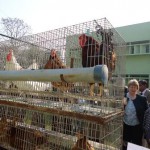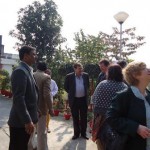6th June 2012 New Delhi, India
A day spent in Indian Veterinary Research Institute (IVRI), Bareilly
In February this year, I travelled to Bareilly, located in northern Indian state of Uttar Pradesh (UP), along with a delegation of UK experts in livestock research to visit IVRI. The visit was part of a joint venture between the Biotechnology and Biological Sciences Research Council (BBSRC) and Indian Department of Biotechnology (DBT) to initiate collaboration in the area of livestock research. This visit was organised after a successful workshop in Delhi wherein the researchers from both countries had already shared notes and identified possible areas of research collaboration.
 The visit began with a brief interaction with researchers from the Central Avian Research Institute (CARI) that is located within the campus of IVRI. Several varieties of birds that have been raised in CARI were displayed much to the delight of our poultry experts. The rest of our day was spent in company of the Director, Prof Sharma, in trying to cover the wide expanse of IVRI including an animal hospital. IVRI is India’s premier advance research facility in livestock research and largest of its kind in whole of South East Asia.
The visit began with a brief interaction with researchers from the Central Avian Research Institute (CARI) that is located within the campus of IVRI. Several varieties of birds that have been raised in CARI were displayed much to the delight of our poultry experts. The rest of our day was spent in company of the Director, Prof Sharma, in trying to cover the wide expanse of IVRI including an animal hospital. IVRI is India’s premier advance research facility in livestock research and largest of its kind in whole of South East Asia.
The administrative control of both IVRI and CARI is with the Indian Council of Agricultural Research (ICAR) which is under Ministry of Agriculture. IVRI was established in 1889 as an Imperial Bacteriological Laboratory at Pune (Maharashtra) and was later shifted to Mukteswar (Uttrakhand) in 1893. All six directors till 1947 have been of British origin. Subsequently, in order to extend the activities of the Institute, the Izatnagar, Bareilly (UP) campus was established in 1913 for large scale production of sera and vaccines. It gradually expanded to its present size with its headquarters at Izatnagar (UP) and campuses at Mukteswar (Uttrakhand), Bangalore (Karnataka), Bhopal (MP) and regional stations at Palampur (HP), Srinagar (J&K) and Kolkata (WB). At present, there are 21 Divisions and 6 Sections specialized in various disciplines/areas with faculty strength of more than 275.
The mandated areas of research activities of the institute include animal health, animal genetic resources, livestock improvement, livestock products technology and basic and social sciences. IVRI has contributed a great deal in control of major animal health diseases in the country, particularly rinderpest and CBPP in cattle, African horse sickness in horses and Newcastle disease in poultry as a result of vaccines developed in house. The institute is widely known for its contributions to all aspects of livestock and poultry health, production technology and postgraduate education and is also reputed for its several outreach extension programmes in the region. 
IVRI has international collaborative projects with European Commission, FAO/ IAEA, USA, UK, World Bank, Switzerland and Australia. Few academics in IVRI are already linked with UK research groups but as stated by the Director, there is certainly a huge appetite to step up these links on a more stronger and sustainable basis.
There was no way we could cover all that IVRI offers within half a day, but this quick tour provided us with a snapshot of the institute’s immense capabilities in the livestock research as noted by the delegates. Though the return journey back to Delhi took us quite a while, but it was well worth the long journey. I was pleased to note few of the delegates already planning on initiating possible partnerships with the institute.
Conference Series LLC welcomes you to the 3rd International Conference on Influenza and Zoonotic Diseases to be held from August 21-22, 2017 in Birmingham, UK. The theme of Influenza 2017 is “Lower the Impact of Influenza on Public Health” Influenza 2017 offers a unique window and opportunities to present and evidence the latest updates with a holistic approach to different areas of interest. We have done our outmost to get rid of the traditional approach in the elaboration of the programme and most importantly, during the active sessions, in order to foster innovation and scientific curiosity. Our intention is, to create platforms which will gather eminent scientists, medical professionals who will undoubtedly enrich the conference.
Many thanks Aiyana in sharing details of the forthcoming event.
Thank you very much the words.Definitely there is great scope and future
for cooperation between two countries.I am in touch Dr Nair for collaboration
in the areas of poultry diseases.
Regards